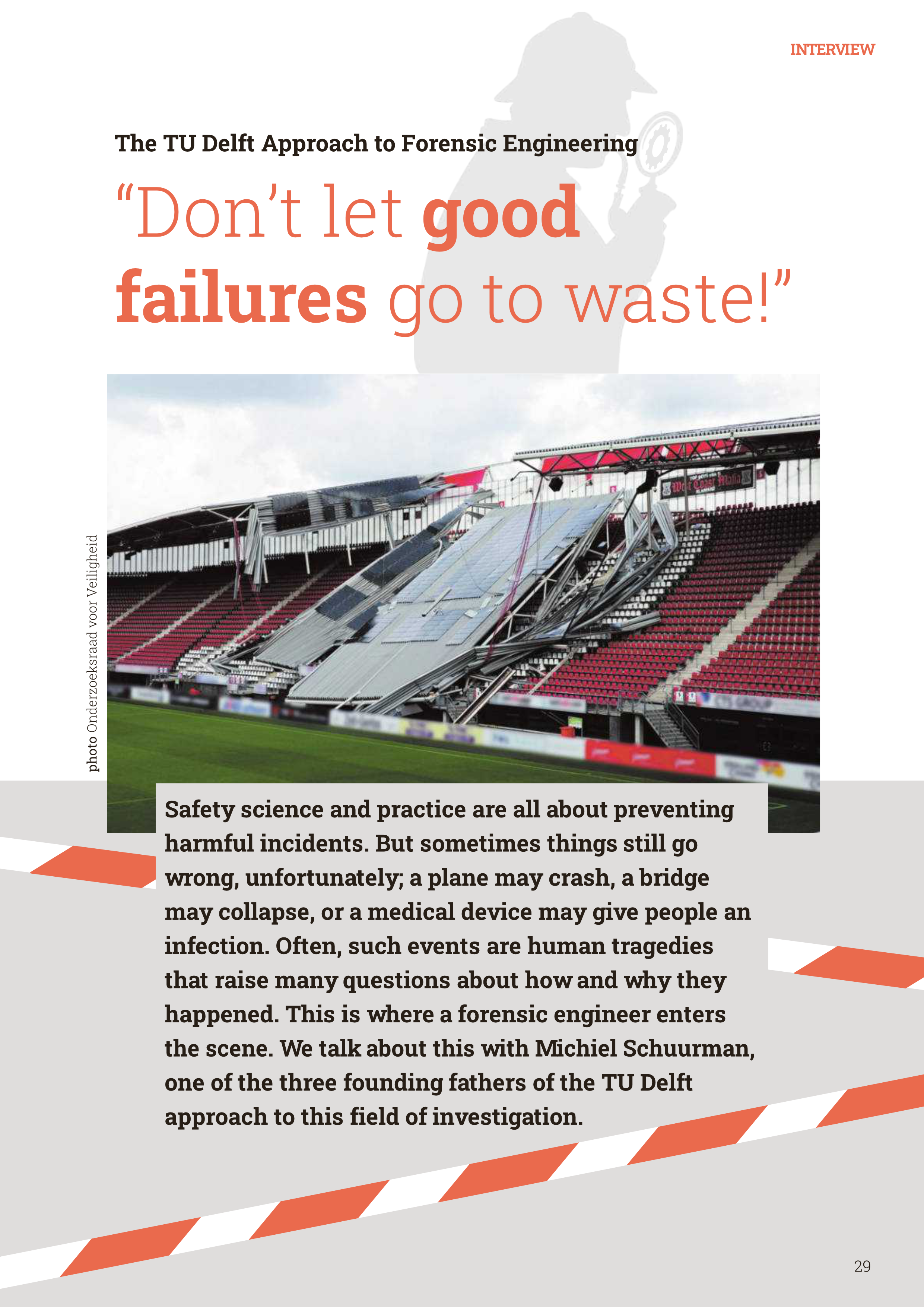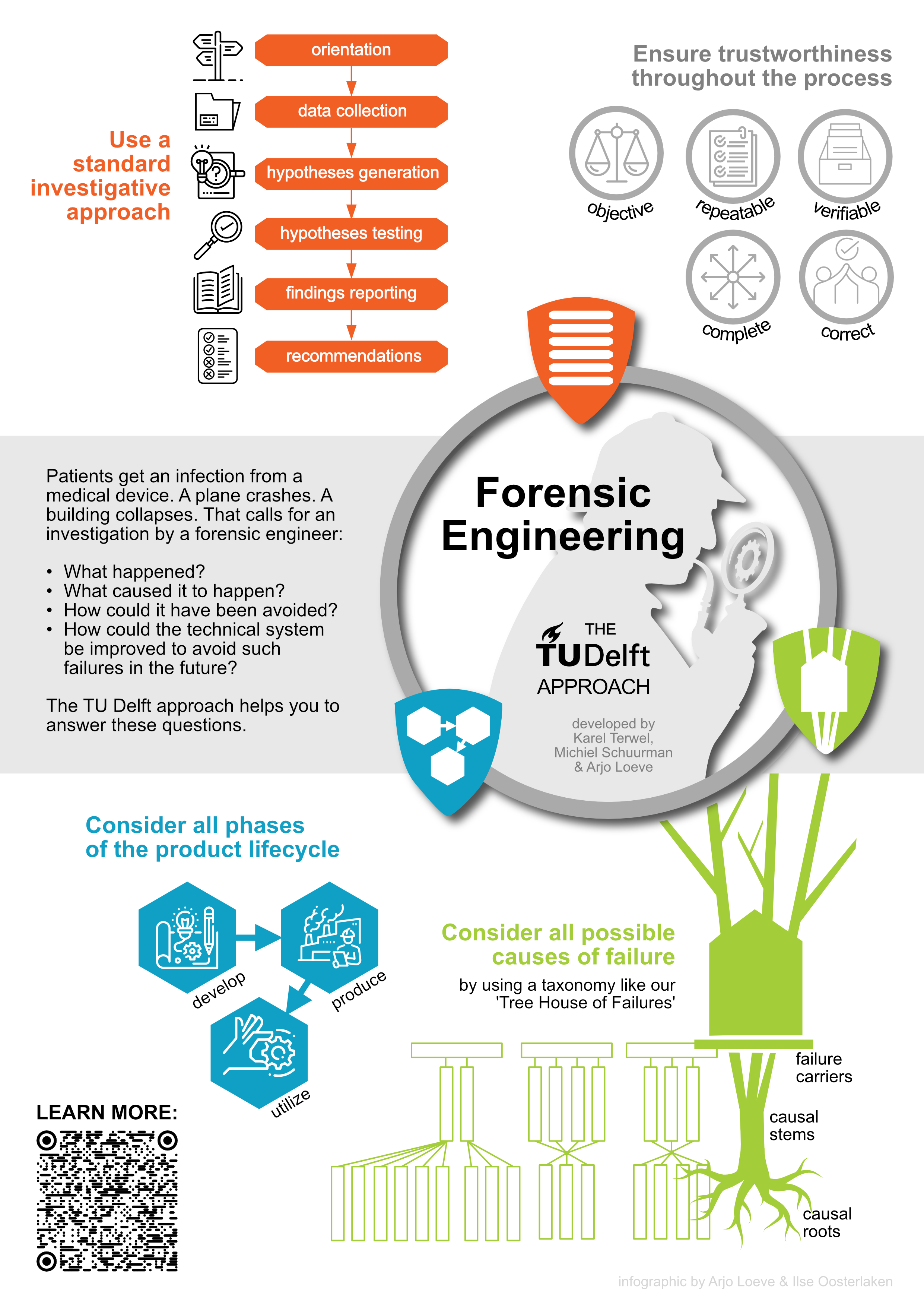“Don't let good failures go to waste!”
Safety science and practice are all about preventing harmful incidents. But sometimes things still go wrong, unfortunately; a plane may crash, a bridge may collapse, or a medical device may give people an infection. Often, such events are human tragedies that raise many questions about how and why they happened. This is where a forensic engineer enters the scene. We talk about this with Michiel Schuurman, one of the three founding fathers of the TU Delft approach to this field of investigation.
Michiel, are you the Sherlock Holmes of TU Delft?
“Well, forensic engineers do carry out investigations, like Sherlock Holmes. But murder is a unique and one-off event, and Holmes stops after answering the ‘whodunnit question’. In contrast, we are not just interested in the causes of an incident, but especially in how it could be prevented in the future, for example by a better technical design or different safety measures. So, any conclusion about causes should have recommendations accompanying it. There is a lot at stake, so it is important to be thorough and arrive at valid conclusions.”
Is this where the TU Delft approach comes in?
“Exactly. It is based on best practices of forensic investigations in three different fields: aerospace engineering, civil engineering and biomechanical engineering. Karel Terwel started the challenge of creating the TU Delft approach. Arjo Loeve and I brought our knowledge from the other two research fields to further develop it. There are numerous methods and models to explain possible causes of accidents, ranging from failing materials to human errors. However, we felt a systematic approach was needed to ensure nothing was missed or overlooked. Using our methods ensures you look at all the possible causes of failure.”
And has the approach already been put into practice?
“Certainly! A good example is the collapse of the roof of the Dutch AZ (soccer) stadium on August 10th, 2019. Forensic investigation was carried out into the failure mode, and a report was published with conclusions on the cause of the collapse. The Dutch Safety Board wanted to determine the validity and completeness of that investigation. Another consulting company was commissioned, and they decided to use our TU Delft Approach. Following our step-by-step process, they arrived at recommendations to consider other possible scenarios and failure mode(s) that were not considered in the initial forensic investigation.”
Fortunately, such accidents are rare. Is there a demand for forensic engineers?
“Judging by the success of our free online course or MOOC on the topic, there is. We have run it since 2017, with 3000-4000 students each year from over 145 countries. The course exposes you not only to the TU Delft mindset to investigate incidents to prevent them in the future, but also confronts you with a wide range of things that could go wrong. This helps to create safety awareness. That is why, I suppose, the course is also being used to train hospital staff and other professionals.
And what about TU Delft students?
“TU Delft is educating the next generation of engineers; in my view, they could all benefit from learning to learn from failures. As I like to say to them: ‘Don’t let good failures go to waste!’ Reading a book and attending lectures is not enough for that. I want them to get their hands dirty, so to speak. At the Faculty of Aerospace Engineering, forensic engineering is used in the context of aircraft accidents. For the final exam of my forensic engineering course, I create a mock crash site somewhere on the campus. Groups of students are tasked to investigate and report on the event. Several students who have taken the course have become safety investigators at airlines and aeroplane manufacturers.”
What does the future hold for forensic engineering at TU Delft?
“Karel, Arjo and I intend to introduce more interactive assignments in the MOOC. Currently, we are working hard on a project that will allow students to experience the Delft approach in an investigation. The present material can also be used to integrate forensic engineering with other courses taught at TU Delft. It would also be great to see more embedded research where TU researchers work with the police and other government agencies on real-life challenges that they face to keep society safe and secure.
Michiel Schuurman is assistant professor at the Structural Integrity and Composites group of the TU Delft Faculty of Aerospace Engineering.
Learn more
- Article 'Improving reliability in forensic engineering: the Delft approach' by Karel Terwel, Michiel Schuurman and Arjo Loeve
- TU Delft MOOC 'Forensic Engineering: Learning from Failures'
Or check out this infographic that summarizes the TU Delft approach to forensic engineerig:


